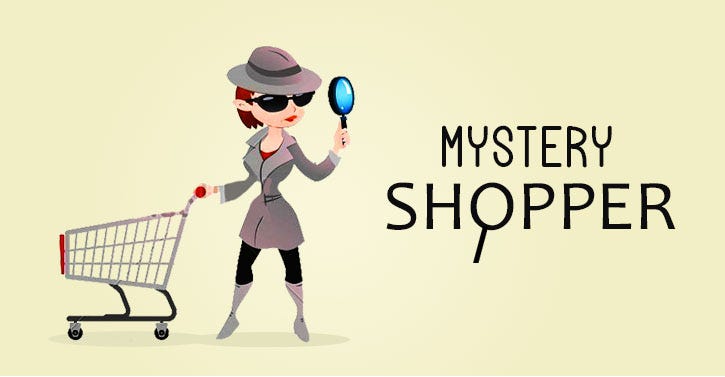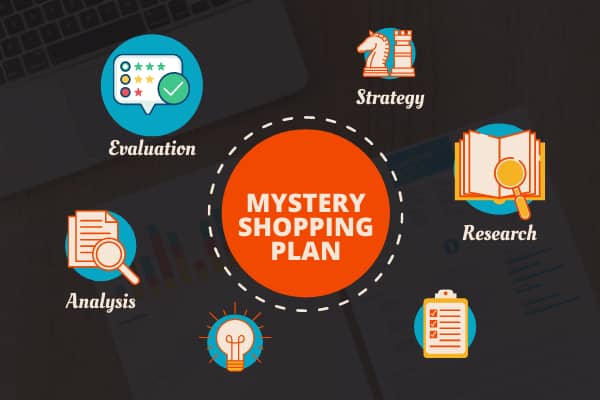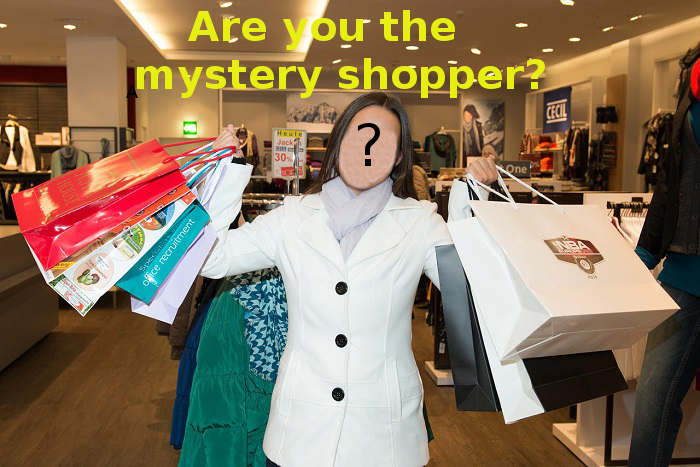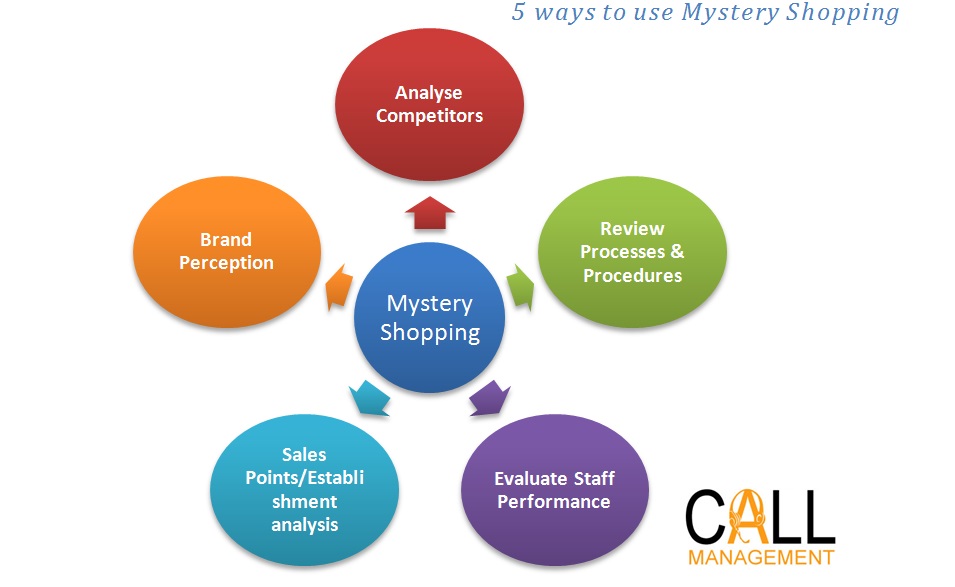What is Mystery Shopping and How Does it Work
Mystery shopping is a market research technique used by businesses to measure the quality of their customer service, products, and overall shopping experience. By hiring individuals to pose as regular customers and provide feedback on their interactions with the company, businesses can gain valuable insights into areas for improvement. This process is often referred to as taking “a closer look” at the customer experience, and it can be a powerful tool for driving growth and increasing customer satisfaction.
Companies that use mystery shopping services come from a wide range of industries, including retail, hospitality, and healthcare. For example, a restaurant chain might hire mystery shoppers to evaluate the quality of their food and service, while a hotel might use mystery shoppers to assess the cleanliness and comfort of their rooms. By using mystery shopping, these businesses can identify areas where they are falling short and make targeted improvements to enhance the customer experience.
The benefits of mystery shopping are numerous. By providing businesses with a detailed and objective assessment of their customer experience, mystery shopping can help companies to identify and address problems before they become major issues. This can lead to increased customer satisfaction, improved loyalty, and ultimately, increased revenue. Additionally, mystery shopping can help businesses to stay competitive in their industry by providing them with valuable insights into the strengths and weaknesses of their competitors.
So, how does mystery shopping work? Typically, a business will hire a mystery shopping company to conduct evaluations of their customer experience. The mystery shopping company will then recruit individuals to pose as customers and provide feedback on their interactions with the business. This feedback is usually collected through surveys, interviews, or written reports, and it is used to provide the business with a detailed and objective assessment of their customer experience.
By taking “a closer look” at the customer experience through mystery shopping, businesses can gain a deeper understanding of their customers’ needs and preferences. This can help them to develop targeted marketing strategies, improve their products and services, and ultimately, drive growth and increase revenue. Whether you’re a business owner looking to improve your customer experience or an individual looking to make some extra money, mystery shopping is definitely worth considering.
How to Become a Successful Mystery Shopper
To become a successful mystery shopper, there are several skills and qualities that are essential. First and foremost, attention to detail is crucial. Mystery shoppers must be able to observe and record their experiences accurately, including details such as the cleanliness of the store, the friendliness of the staff, and the quality of the products. Additionally, good communication skills are necessary, as mystery shoppers must be able to clearly and concisely report their findings.
Another important quality for mystery shoppers is objectivity. They must be able to evaluate their experiences without bias or prejudice, providing an honest and impartial assessment of the business. This requires a high degree of professionalism and the ability to remain detached from the experience.
In terms of finding mystery shopping opportunities, there are several options available. Many companies hire mystery shoppers directly, while others use third-party agencies to manage their mystery shopping programs. These agencies often have websites where individuals can sign up to become mystery shoppers and browse available assignments.
To complete assignments effectively, mystery shoppers must be able to follow instructions carefully and thoroughly. This includes understanding the specific requirements of the assignment, such as the tasks to be completed and the evaluation criteria to be used. Additionally, mystery shoppers must be able to manage their time efficiently, ensuring that they complete the assignment within the allotted timeframe.
For those looking to take “a closer look” at the world of mystery shopping, there are several resources available. Many companies offer training programs or guidelines for mystery shoppers, which can help individuals to develop the skills and knowledge needed to succeed in this field. Additionally, online forums and communities can provide valuable insights and advice from experienced mystery shoppers.
By developing the necessary skills and qualities, and by taking advantage of the resources available, individuals can become successful mystery shoppers and enjoy the benefits of this flexible and rewarding opportunity. Whether you’re looking to earn some extra money or simply want to explore a new field, mystery shopping can be a fun and challenging way to get involved.
Some popular mystery shopping companies include Market Force, BestMark, and Intellishop. These companies offer a range of assignments and opportunities for mystery shoppers, and can be a good starting point for those looking to get involved in the industry.
A Closer Look at Mystery Shop Evaluation Criteria
Mystery shopping evaluation criteria are the standards used to assess the quality of service, product knowledge, and overall customer experience at a particular store or establishment. These criteria are designed to provide a comprehensive and objective evaluation of the shopping experience, helping businesses identify areas for improvement and make data-driven decisions to enhance customer satisfaction.
Customer service is a critical component of the mystery shop evaluation criteria. Mystery shoppers assess the friendliness, helpfulness, and responsiveness of sales associates, as well as their ability to answer questions and resolve issues. They also evaluate the overall attitude and demeanor of staff, including their willingness to go above and beyond to meet customer needs.
Product knowledge is another key aspect of the evaluation criteria. Mystery shoppers assess the sales associates’ knowledge of products, including features, benefits, and pricing. They also evaluate the associates’ ability to make recommendations and provide guidance on product selection.
Store appearance is also an important factor in the evaluation criteria. Mystery shoppers assess the cleanliness, organization, and overall aesthetic appeal of the store, including the condition of displays, signage, and fixtures. They also evaluate the availability of products and the ease of navigation throughout the store.
Mystery shoppers use evaluation forms to assess these criteria and provide detailed feedback to businesses. These forms typically include a series of questions and ratings scales, allowing mystery shoppers to provide quantitative and qualitative feedback on their shopping experience.
For example, a mystery shopping evaluation form for a retail store might include questions such as:
- Was the sales associate friendly and welcoming? (Rating scale: 1-5)
- Did the sales associate have knowledge of the products and answer questions effectively? (Rating scale: 1-5)
- Was the store clean and well-organized? (Rating scale: 1-5)
- Were products clearly labeled and priced? (Yes/No)
By using these evaluation criteria and forms, mystery shoppers provide businesses with valuable insights into the customer experience, helping them identify areas for improvement and make targeted changes to enhance customer satisfaction and loyalty.
Real-Life Examples of Mystery Shopping Assignments
Mystery shopping assignments can vary widely depending on the company, industry, and specific goals of the assignment. Here are a few real-life examples of mystery shopping assignments from well-known companies:
Example 1: McDonald’s Drive-Thru Evaluation
In this assignment, mystery shoppers were tasked with visiting McDonald’s locations and evaluating the drive-thru experience. They were instructed to order a specific meal, observe the speed and accuracy of the service, and assess the friendliness and attentiveness of the staff. The shoppers were also asked to evaluate the cleanliness and appearance of the drive-thru area and the overall quality of the food.
Example 2: Walmart Store Appearance Evaluation
In this assignment, mystery shoppers were tasked with visiting Walmart stores and evaluating the appearance and cleanliness of the store. They were instructed to observe the condition of the floors, shelves, and displays, as well as the availability and organization of products. The shoppers were also asked to assess the overall aesthetic appeal of the store and identify any areas for improvement.
Example 3: Bank Customer Service Evaluation
In this assignment, mystery shoppers were tasked with visiting bank branches and evaluating the customer service experience. They were instructed to pose as customers and ask specific questions about banking products and services. The shoppers were asked to assess the knowledge and responsiveness of the bank staff, as well as the overall friendliness and welcoming nature of the branch.
Example 4: Hotel Check-In Evaluation
In this assignment, mystery shoppers were tasked with visiting hotels and evaluating the check-in experience. They were instructed to pose as guests and observe the speed and efficiency of the check-in process. The shoppers were also asked to assess the friendliness and attentiveness of the front desk staff, as well as the overall cleanliness and appearance of the lobby and guest rooms.
These examples illustrate the variety of mystery shopping assignments that can be conducted across different industries and companies. By using mystery shopping, businesses can gain valuable insights into the customer experience and identify areas for improvement to enhance customer satisfaction and loyalty.
How Mystery Shopping Can Improve Customer Experience
Mystery shopping is a valuable tool for businesses to improve customer experience and increase customer satisfaction. By using mystery shopping, companies can identify areas for improvement, provide feedback to employees, and enhance overall customer satisfaction.
One of the primary ways that mystery shopping can improve customer experience is by identifying areas for improvement. Mystery shoppers can provide detailed feedback on the customer experience, including the quality of service, product knowledge, and store appearance. This feedback can be used to identify areas where the business is falling short and make targeted changes to improve the customer experience.
Another way that mystery shopping can improve customer experience is by providing feedback to employees. Mystery shoppers can provide feedback on the performance of individual employees, including their customer service skills, product knowledge, and overall attitude. This feedback can be used to provide coaching and training to employees, helping them to improve their performance and provide better service to customers.
Mystery shopping can also help businesses to enhance overall customer satisfaction. By using mystery shopping, companies can identify areas where they are exceeding customer expectations and build on those strengths. They can also identify areas where they are falling short and make changes to improve the customer experience.
Some of the specific ways that mystery shopping can improve customer experience include:
- Improving customer service skills: Mystery shopping can help businesses to identify areas where customer service skills need improvement and provide training and coaching to employees.
- Increasing product knowledge: Mystery shopping can help businesses to identify areas where product knowledge is lacking and provide training and coaching to employees.
- Enhancing store appearance: Mystery shopping can help businesses to identify areas where store appearance is lacking and make changes to improve the overall aesthetic appeal of the store.
- Reducing wait times: Mystery shopping can help businesses to identify areas where wait times are excessive and make changes to reduce wait times and improve the overall efficiency of the business.
Overall, mystery shopping is a valuable tool for businesses to improve customer experience and increase customer satisfaction. By using mystery shopping, companies can identify areas for improvement, provide feedback to employees, and enhance overall customer satisfaction.
Common Mistakes to Avoid in Mystery Shopping
Mystery shopping can be a rewarding and flexible way to earn extra income, but it requires attention to detail and a professional approach. Here are some common mistakes to avoid in mystery shopping:
Incomplete or Inaccurate Reports
One of the most common mistakes in mystery shopping is submitting incomplete or inaccurate reports. This can happen when mystery shoppers fail to follow instructions, miss important details, or don’t take the time to thoroughly complete the report. To avoid this mistake, make sure to carefully read and follow the instructions provided by the client, and take the time to thoroughly complete the report.
Failure to Follow Instructions
Another common mistake in mystery shopping is failing to follow instructions. This can include not visiting the correct location, not completing the required tasks, or not submitting the report on time. To avoid this mistake, make sure to carefully read and follow the instructions provided by the client, and ask questions if you’re unsure about anything.
Unprofessional Behavior
Unprofessional behavior is another common mistake in mystery shopping. This can include being rude or dismissive to employees, not respecting the store’s policies, or not maintaining confidentiality. To avoid this mistake, make sure to always behave in a professional and respectful manner, and follow the store’s policies and procedures.
Not Maintaining Confidentiality
Mystery shopping requires maintaining confidentiality, which means not disclosing the fact that you’re a mystery shopper to anyone, including employees or other customers. To avoid this mistake, make sure to keep your mystery shopping activities confidential, and only disclose information to the client or authorized personnel.
Not Following the Script
Some mystery shopping assignments require following a script or scenario, which can include asking specific questions or making specific purchases. To avoid this mistake, make sure to carefully read and follow the script or scenario provided by the client, and ask questions if you’re unsure about anything.
Not Submitting Reports on Time
Finally, not submitting reports on time is another common mistake in mystery shopping. To avoid this mistake, make sure to submit your reports on time, and follow up with the client if you have any questions or concerns.
By avoiding these common mistakes, you can ensure a successful and rewarding mystery shopping experience, and provide valuable feedback to businesses to help them improve their customer experience.
Maximizing Your Earnings as a Mystery Shopper
As a mystery shopper, you have the opportunity to earn a flexible and rewarding income. However, to maximize your earnings, you need to be strategic and efficient in your approach. Here are some tips to help you maximize your earnings as a mystery shopper:
Find High-Paying Assignments
One of the most important factors in maximizing your earnings as a mystery shopper is finding high-paying assignments. Look for assignments that offer a high reimbursement rate or a bonus for completing specific tasks. You can also search for assignments in high-demand areas, such as major cities or tourist destinations.
Complete Assignments Efficiently
Another key factor in maximizing your earnings as a mystery shopper is completing assignments efficiently. This means being able to complete assignments quickly and accurately, while also providing high-quality feedback to clients. To achieve this, make sure to carefully read and follow the instructions provided by the client, and use a systematic approach to complete the assignment.
Negotiate with Clients
Negotiating with clients is also an important aspect of maximizing your earnings as a mystery shopper. If you’re able to negotiate a higher reimbursement rate or bonus, you can increase your earnings. To negotiate effectively, make sure to research the market rate for mystery shopping assignments and be confident in your abilities.
Build a Strong Reputation
Building a strong reputation as a mystery shopper is also crucial in maximizing your earnings. This means consistently providing high-quality feedback and completing assignments efficiently. By building a strong reputation, you can increase your chances of getting hired for high-paying assignments and negotiating better rates.
Use Technology to Your Advantage
Finally, using technology to your advantage can also help you maximize your earnings as a mystery shopper. Consider using apps or software that can help you streamline your workflow, track your assignments, and communicate with clients more efficiently.
Some popular apps and software for mystery shoppers include:
- Mystery Shopping Apps: These apps allow you to search for assignments, track your progress, and communicate with clients on the go.
- Project Management Software: These tools help you organize and prioritize your assignments, set deadlines, and track your progress.
- Time Tracking Software: These tools help you track the time spent on assignments, generate reports, and invoice clients.
By following these tips and using technology to your advantage, you can maximize your earnings as a mystery shopper and enjoy a flexible and rewarding income.
Conclusion: The Benefits of Mystery Shopping
Mystery shopping is a valuable tool for businesses to improve customer experience, provide valuable feedback, and offer a flexible and rewarding opportunity for individuals. By understanding the concept of mystery shopping, its benefits, and how it works, businesses can make informed decisions to improve their customer experience and increase customer satisfaction.
The benefits of mystery shopping are numerous. It provides businesses with valuable feedback on their customer service, product knowledge, and store appearance, allowing them to identify areas for improvement and make targeted changes. Mystery shopping also offers a flexible and rewarding opportunity for individuals to earn extra income and gain valuable experience in customer service and market research.
In addition, mystery shopping can help businesses to improve their customer experience by identifying areas for improvement, providing feedback to employees, and enhancing overall customer satisfaction. By using mystery shopping, businesses can gain a competitive edge in their industry and increase customer loyalty and retention.
Overall, mystery shopping is a valuable tool for businesses and individuals alike. By understanding its benefits and how it works, businesses can make informed decisions to improve their customer experience and increase customer satisfaction. Individuals can also benefit from mystery shopping by earning extra income and gaining valuable experience in customer service and market research.
In conclusion, mystery shopping is a powerful tool that can help businesses to improve their customer experience, provide valuable feedback, and offer a flexible and rewarding opportunity for individuals. By incorporating mystery shopping into their business strategy, companies can gain a competitive edge in their industry and increase customer loyalty and retention.







